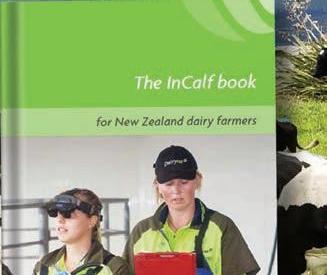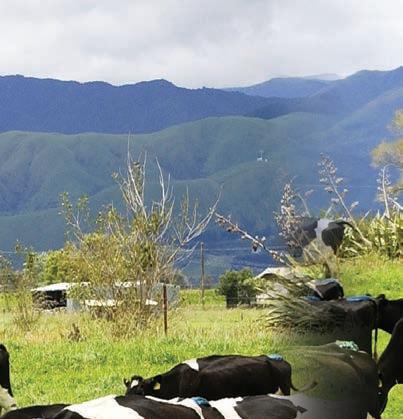
7 minute read
Fixed milk price
from Dairy Farmer February 2021
by AgriHQ
Fonterra’s FMP proves popular
By Gerald Piddock
Fonterra’s fixed milk price (FMP) scheme is a great tool for protection from the historic volatility seen in dairy prices.
But people need to still do their homework and talk to their financial advisors before signing up to it, farmers were told during an online presentation organised by the Smaller Milk and Supply
Herds group.
The tool allows farmers to ‘fix’ up to 50% of their estimated production for the season at a set price, starting from
March through to December, Fonterra innovation manager Satwant Singh says.
They could fix all of that in one event or smaller amounts throughout the season.
“The important bit is to make sure you do your homework and talk to your financial advisor before you participate,”
Singh says.
She says there has been an increase in farmers using fixed milk pricing with over 1600 signing up.
“That’s around 18% of our farms which have locked in some portion of their milk price this season,” she says.
It was a huge amount, but it had been a rollercoaster of a season.
Waikato farmer Gaynor Tierney used fixed milk pricing for the first time this season. The uncertainty around the covid-19 pandemic, the unease around the direction of the milk price and a new farm purchase led to their decision to fix 30% of their milk price.
She says they wanted a level of stability in their business.
“We were really trying to cover our downside risk. We calculated with the new property and our income coming in from the dairy farm that we really wanted to have a $6/kg MS milk price and we wanted to make that as stable as possible for us,” Tierney says. More than 1600, or about 18%, of farmers have signed up to Fonterra’s fixed milk price scheme.
Some banks had predicted a $5.40 milk price for the season and fixing the price offset that risk.
With the benefit of hindsight, Tierney says they probably would not have locked in the price at $6, given how the price had lifted steadily over the course of the season.
Waikato accountant Nigel McWilliam described it as a downside risk protection tool for farmers, rather than a tool for gaining a high milk price.
It was a futures contract where a buyer and seller make a delivery of a product at an agreed date, but the price is decided beforehand.
“The whole point of it is to protect you against price volatility,” McWilliam says.
While the milk price had been largely settled over the past few seasons, there was no guarantee that would continue into the future.
“If there are any jitters in the market, that’s where you start to look at fixed milk pricing,” he says.
It was done to offset the chance of the milk price losing value over the duration of the season. Examples of this occurring in previous years are when farmers were told there would be a $7/kg MS payout and it fell to $3.90.
“The key to it is protection from loss. If you enter a fixed milk price from that mindset, it’s a tool you can use,” he says.
It took 15 months for dairy farmers to get paid for the milk collected over
the course of a season. Over the course of that period, farmers had to consider climate risk, currency volatility, trade restrictions, the ongoing impacts of the pandemic as well as internal risks such as on-farm costs.
“From a risk perspective, things are pretty high when you really drill into it, so hence the need to think about fixed milk pricing,” he says.
McWilliam says it was also a useful tool for those farmers in a high debt situation.
“Approach it like that, then there’s no regret, so if you do go below the market, at least you know you can cover your breakeven milk price and avoid financial distress later,” he says.
For farmers with moderate debt levels, it would likely increase the support received from banks.
“You just get greater confidence with your interest rate. We have certainly noticed that with those who have engaged with FMP,” he says.
“The credit pressure’s come off and they have saved money on the expense side, rather than worrying about what they have locked in on the income side.” n
Grant Watson is the new chief executive of Taupo-based dairy company, Miraka.
Watson is a past winner of the New Zealand Young Executive of the Year and recently led the significant growth of Fonterra’s Global Foodservice business. Prior to that he was the director of Tip Top and the former chief operating officer for McDonald’s New Zealand.
Announcing Grant’s appointment, the chairman of Miraka Kingi Smiler said “Grant’s appointment marks another chapter in our company’s history as we embark on expanding our consumer products that carry our unique brand stories.”
Watson will take up the new position on February 3. n

Techweek2021
The theme for Techweek2021 has been announced – Connecting for a better future.
Techweek is a nationwide series of events, showcasing and celebrating NZ innovation that provides a platform for everyone to meet, share ideas and create connections to enhance our future world.
Techweek2021 will be a mix of live, virtual and hybrid events, so there’s something to suit everyone. Physical events will be carried out right across the country, while virtual events can be attended and enjoyed from anywhere in the world.
Event submissions are now open for Techweek2021.
Techweek events vary from major conferences to small meetups on niche topics, hackathons, workshops, networking events and webinars. If you have a great idea or want to showcase, be sure to submit your event. n
Animal AgTech Innovation Summit
The 2021 Animal AgTech Innovation Summit is going virtual.
Participate live online on March 8 to accelerate innovation in animal health and welfare, sustainability and farm to fork solutions.
Bringing the industry ecosystem together is the top priority for the Animal AgTech Innovation Summit.
From precision farming and connected supply chains, to new frontiers in alternative feeds, breeding and genetics, the summit will address the most important challenges and opportunities in today’s livestock, dairy and aquaculture industries, including lessons learned from adjacent industries.
As we look ahead into 2021 and beyond, the summit will provide an essential platform for knowledge-sharing as well as networking, through a valuable mix of live-streamed sessions, start-up pitches, breakout discussion groups and 1-1 video networking. n

TAMA weighs covid impact

Tractor sales rebounded at the end of last year, but still finished down on 2019 overall.
The industry finished 2020 on a strong note, with December sales up 18.4% on 2019.
Tractor and Machinery Association (TAMA) president Kyle Baxter says that while 2020 definitely posed challenges for the industry, the current mood of members is positive.
Overall tractor sales for 2020 were down 15.3% compared with 2019, with sales for the bigger machines (375+ HP) particularly affected with a drop of 25%.
Baxter says nobody in the industry was surprised with the reduction in sales for the high-end tractor investments.
“Tractor distribution companies had been envisaging a reduction in sales going into 2020, however, as a result of the pandemic sales reduced slightly more than expected,” Baxter says.
TAMA members are now reporting that demand for tractors and equipment is steadily building across the country, as customers are beginning to secure their machines for spring/summer 2021. n




What is your 6-week in-calf rate this season?


The InCalf book is designed to help maximise the rate your cows get in calf.












